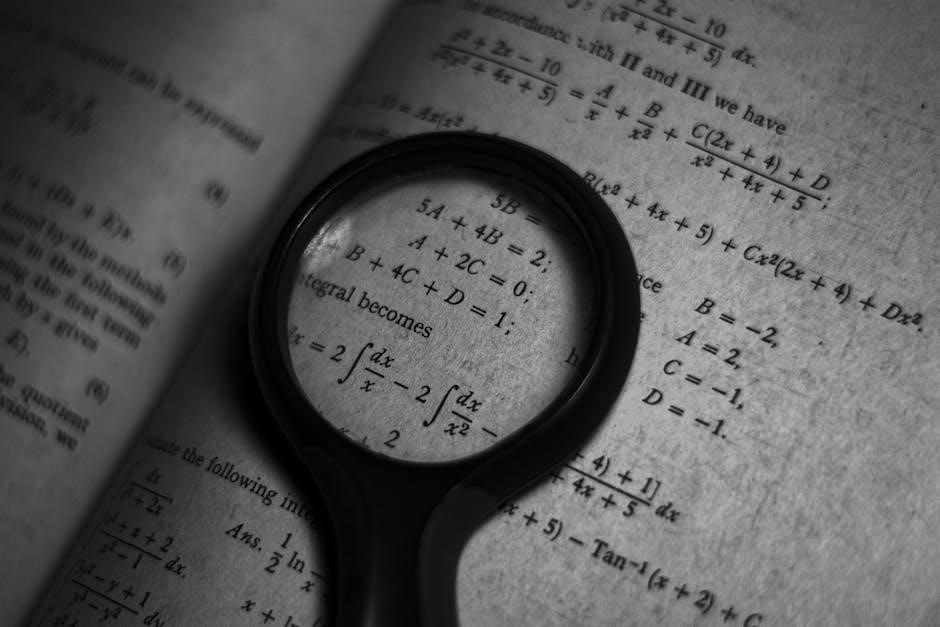Year 6 algebra worksheets are essential resources for students to master foundational algebra skills‚ offering engaging exercises from trusted sources like BBC Bitesize and White Rose Maths.
1.1 Importance of Algebra in Year 6 Curriculum
Algebra is a cornerstone of mathematics‚ and its introduction in Year 6 is vital for building problem-solving and logical thinking skills. It enables students to understand patterns‚ relationships‚ and abstract concepts‚ which are fundamental for advanced math. By learning to manipulate variables and solve equations‚ pupils develop analytical abilities that benefit other subjects. Algebra also enhances numerical fluency and prepares students for real-world applications‚ such as science and finance. Incorporating algebra worksheets into the curriculum ensures consistent practice‚ reinforcing these essential skills and fostering confidence in tackling complex mathematical challenges. This foundation is critical for future academic success.
1.2 Role of Worksheets in Reinforcing Algebraic Concepts
Worksheets play a pivotal role in reinforcing algebraic concepts for Year 6 students by providing structured and focused practice. They offer a variety of exercises‚ from generating expressions to solving equations‚ allowing pupils to apply theoretical knowledge practically. Regular use of worksheets helps build fluency‚ confidence‚ and problem-solving skills. Many worksheets include step-by-step solutions‚ enabling students to understand and correct their mistakes independently. Interactive and engaging designs‚ such as those found in BBC Bitesize and White Rose Maths resources‚ make learning enjoyable and effective. By consistently practicing with worksheets‚ students develop a strong foundation in algebra‚ essential for progressing to more complex mathematical topics. These resources are tailored to meet curriculum requirements and support individual learning needs.

Key Topics Covered in Year 6 Algebra Worksheets
Year 6 algebra worksheets cover essential topics such as generating algebraic expressions‚ solving simple equations‚ and understanding linear sequences. These exercises build foundational math skills effectively.
2.1 Generating and Calculating Algebraic Expressions
Generating and calculating algebraic expressions are fundamental skills developed through Year 6 algebra worksheets. Students learn to translate real-world problems into mathematical expressions‚ using variables and constants. These exercises often involve forming expressions from word problems and calculating their values. For example‚ worksheets might include scenarios where students determine the total cost of items or distances‚ incorporating operations like addition‚ subtraction‚ multiplication‚ and division. Such activities enhance problem-solving abilities and mathematical reasoning‚ preparing students for more complex algebra in higher grades. The structured format of these worksheets ensures a comprehensive understanding of expression generation and calculation‚ fostering confidence and fluency in algebraic manipulation.
2.2 Solving Simple Equations and Formulas
Solving simple equations and formulas is a core focus of Year 6 algebra worksheets. These resources provide structured exercises where students learn to manipulate equations‚ apply inverse operations‚ and isolate variables. Worksheets often include one-step and two-step equations‚ encouraging students to use mathematical logic and problem-solving skills. For example‚ solving for ( x ) in equations like ( 2x + 3 = 7 ) or ( 5y ― 4 = 11 ) helps students understand algebraic principles. Many worksheets also introduce basic formulas‚ such as calculating perimeter or area‚ to apply algebraic skills to real-world problems. Step-by-step solutions are frequently included to guide students and reinforce their understanding of equation-solving processes.
2.3 Understanding Linear Sequences and Patterns
Linear sequences and patterns are key topics in Year 6 algebra worksheets‚ helping students identify and extend relationships between numbers. Worksheets often present sequences like 3‚ 6‚ 9‚ 12‚ asking students to determine the next term and the common difference. Patterns may involve shapes‚ such as repeating color or object sequences‚ encouraging visual and logical thinking. These exercises develop students’ ability to recognize and describe linear relationships‚ preparing them for more complex algebraic concepts. Many resources include real-world applications‚ like financial calculations or sports statistics‚ to make learning engaging and practical. By solving these problems‚ students build their analytical skills and understanding of predictable numerical and visual sequences.

Benefits of Using Year 6 Algebra Worksheets
Year 6 algebra worksheets provide structured practice‚ enhancing fluency and understanding through arithmetic questions‚ step-by-step solutions‚ and interactive resources‚ making learning algebra engaging and effective.
Year 6 algebra worksheets incorporate arithmetic questions to enhance fluency in mathematical operations‚ which is crucial for tackling algebraic problems with confidence. These questions‚ often found in resources like those from BBC Bitesize and White Rose Maths‚ are designed to reinforce basic skills such as addition‚ subtraction‚ multiplication‚ and division. By regularly practicing these fundamentals‚ students build a strong foundation that enables them to approach algebra with ease. The worksheets typically include a set number of arithmetic questions‚ ensuring consistent practice and mastery of essential numerical skills. This fluency is vital for more complex algebraic concepts‚ making these worksheets an invaluable tool for Year 6 students. Year 6 algebra worksheets often include step-by-step solutions to help students grasp complex concepts. These detailed explanations guide learners through problem-solving processes‚ enabling them to understand how to approach and solve algebraic problems. By breaking down each question into manageable steps‚ students can identify where they might go wrong and learn from their mistakes. Many worksheets‚ such as those from BBC Bitesize and White Rose Maths‚ provide clear answer keys with explanations‚ allowing students to refer back and clarify doubts. This feature not only enhances understanding but also builds confidence‚ helping students master algebraic principles effectively. Such resources are particularly useful for reinforcing learning and improving problem-solving skills. Year 6 algebra worksheets are designed to create interactive and engaging learning experiences‚ making algebra accessible and enjoyable for students. Many resources‚ such as those from Cazoom Maths and BBC Bitesize‚ incorporate puzzle-based exercises‚ quizzes‚ and problem-solving activities that challenge students in a fun way. These interactive elements help students stay motivated and develop a deeper understanding of algebraic concepts. Some worksheets also include visual aids‚ such as diagrams and charts‚ to simplify complex ideas. By combining practical exercises with creative approaches‚ these resources make learning algebra an engaging and dynamic process for Year 6 pupils‚ fostering a positive attitude toward maths. Popular resources for Year 6 algebra worksheets include BBC Bitesize‚ White Rose Maths‚ and Cazoom Maths‚ offering free‚ printable PDFs with step-by-step solutions for effective learning. Free PDF worksheets for Year 6 algebra are widely available on educational websites like Cazoom Maths and AU Maths. These resources cover various topics such as generating algebraic expressions‚ solving simple equations‚ and understanding linear sequences. They often include interactive exercises and step-by-step solutions to help students grasp complex concepts. Many worksheets are specifically designed for fluency practice‚ featuring arithmetic questions and consolidation exercises. Additionally‚ some websites offer answer keys‚ enabling students to check their work and improve independently. These free resources are ideal for teachers and parents seeking to supplement classroom learning with engaging and challenging activities tailored for 10-11 year olds. BBC Bitesize and White Rose Maths provide exceptional resources for Year 6 algebra. BBC Bitesize offers daily lessons with interactive algebra exercises‚ while White Rose Maths features comprehensive PDF worksheets. These resources cover topics like function machines‚ simple equations‚ and linear sequences. White Rose Maths’ Spring Term BLOCK 3 focuses on algebra‚ offering detailed teacher-made materials. Both platforms ensure engaging and structured learning experiences‚ perfect for 10-11 year olds. Their resources are designed to support both classroom teaching and home learning‚ making them invaluable for students and educators alike. Year 6 algebra worksheets are invaluable for building foundational skills‚ offering structured practice and interactive learning experiences that prepare students for advanced math concepts with confidence. Year 6 algebra worksheets provide a comprehensive approach to learning algebra‚ offering structured practice‚ step-by-step solutions‚ and interactive exercises. These resources‚ available as free PDFs from educational sites like BBC Bitesize and White Rose Maths‚ help students build fluency in arithmetic and algebraic expressions. They cover essential topics such as solving equations‚ understanding sequences‚ and applying formulas. By incorporating engaging activities and consolidation questions‚ these worksheets ensure a deep understanding of algebraic concepts. Additionally‚ their availability in printable formats makes them accessible for both classroom and home use‚ catering to diverse learning needs and styles. They are a valuable tool for teachers and students alike‚ fostering confidence and proficiency in mathematics.3.1 Fluency Practice Through Arithmetic Questions

3.2 Step-by-Step Solutions for Better Understanding
3.3 Interactive and Engaging Learning Experiences

Popular Resources for Year 6 Algebra Worksheets
4.1 Free PDF Worksheets from Educational Websites
4.2 BBC Bitesize and White Rose Maths Resources
5.1 Summarizing the Value of Year 6 Algebra Worksheets